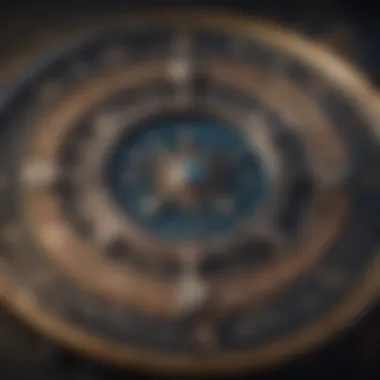Understanding Horoscopes: The Role of Birth Dates


Intro
Astrology remains a profound interest for many, offering insights that connect personal experiences with the cosmos. Understanding the relationship between association with celestial bodies as defined through your birth date affords a deeper grasp on individual personality traits, decisions, and predictions. Harnessing this astrological wisdom can illuminate personal growth and offer guidance through life's myriad of choices.
Characteristics of Each Zodiac Sign
Zodiac signs are the cornerstone of astrology and hold great significance in interpreting personality. Each sign is defined by specific personality traits, strengths, weaknesses, and compatibility with other signs. Copious people find that their zodiac sign acts as a guide, providing insights into their interactions and inclinations.
Overview of personality traits
The twelve zodiac signs are more than mere names. They embody certain characteristics based on their elemental nature and ruling planets. Here’s a brief overview:
- Aries: Bold, enthusiastic, but can be impulsive.
- Taurus: Patient and reliable but has a tendency to be stubborn.
- Gemini: Versatile and communicative yet can be indecisive.
- Cancer: Nurturing with strong emotional depth. However, they may be overly sensitive.
- Leo: Confident and creative but can seek too much attention.
- Virgo: Analytical and detail-oriented, yet prone to worry.
- Libra: Diplomatic and fair-minded though can struggle with indecision.
- Scorpio: Passionate and determined but can be secretive.
- Sagittarius: Adventurous and optimistic, but may lack patience.
- Capricorn: Disciplined and ambitious, however can be too serious.
- Aquarius: Innovative and independent yet can be unpredictable.
- Pisces: Empathetic and imaginative but can be escapist.
Strengths and weaknesses
Each sign also possesses distinctive strengths and weaknesses:
Strengths include:
- Leadership abilities from Aries and Leo.
- Reliability from Taurus.
- Intellect from Gemini.
Weaknesses of some signs include:
- Stubbornness from Taurus.
- Emotional complexity from Cancer.
- Impulsivity from Sagittarius.
Compatibility with other signs
Understanding compatibility is crucial in relationships. Certain signs pair well together based on shared traits or elemental relations. Fate and connection are often linked here, suggesting:
- Fire signs (Aries, Leo, Sagittarius) tend to bond well with other Fire signs or Air signs (Gemini, Libra, Aquarius).
- Earth signs (Taurus, Virgo, Capricorn) frequently find deep understanding with fellow Earth signs and Water signs (Cancer, Scorpio, Pisces).
- Air signs typically connect with Fire signs for dynamic partnerships.
- Water signs are commonly seen merging well with Earth signs, offering each other depth and support.
Daily, Weekly, Monthly Horoscopes
Daily, weekly, and monthly horoscopes provide tailored predictions for each zodiac sign. A person can glean insights about tasks, challenges, and key focus areas, enhancing clarity toward daily or future actions. Predictions might cover:
- Personal connections and emotional well-being.
- Career movements and financial outlooks.
Love and Relationships Horoscopes
Astrology plays a vital role in understanding romantic motivations too. Love horoscopes focus on partners’ dynamics, compatibility, and areas needing attention, guiding individuals to nurture more fruitful relationships.
Understanding Birth Charts
A birth chart details the positioning of celestial bodies at one's birth. Understanding how to interpret this chart gives great understanding of what zodiac signs influence personal behavior.
Astrological Events and Celestial Occurrences
Knowing significant astrological events, such as lunar eclipses, enhances comprehension of how cosmos influence daily life. Attention to retrogrades can explain periods of introspection or reevaluation.
Beginners Guidance to Astrology
Those new to astrology can explore basics through beginner guides, enhancing your grasp to learn horoscopes, zodiac signs, and tarot insights.
Overall, the universe holds insights tailored for every zodiac, providing paths for understanding oneself deeply. This narrative not only clarifies horoscopes through birth dates but encourages reflective consideration on one’s place within the cosmos.
Intro to Horoscopes and Birth Dates
Horoscopes hold a profound significance for many individuals seeking insights into their lives, relationships, and personalities. They provide a framework through which people can understand various aspects of their existence, including decision-making and personal growth. The area of horoscopes is closely tied to birth dates, forming the essence of personal astrological readings.
Defining Horoscopes:
In astrology, a horoscope is more than just a daily prediction. It represents a personalized interpretation of celestial positions at a specific moment, notably at one's birth. There are twelve main zodiac signs that people link their characteristics and potential decisions to. Each sign encapsulates its unique traits, personality discrepancies, and life paths influenced by the planets' spacing, angles, and movements.
The Role of Birth Dates in Astrology:


Birth dates are critical in the context of astrology. They determine an individual’s zodiac sign, which sets the foundation for astrological exploration. Every birth date corresponds with specific celestial events, providing a snapshot of how cosmic forces have shaped a unique personal journey. Additionally, birth dates interact with various astrological components such as houses and aspects, adding depth to a horoscope reading. Understanding how these elements work together reveals much about one's inclinations, challenges, and potential for success. As individuals work to navigate complexity of life, comprehending how horoscopes relate to their birth dates becomes not only insightful but essential for making informed life choices.
Understanding horoscopes through birth dates allows for deeper exploration of one's personality, ultimately affecting key life decisions and relationship dynamics.
This introduction lays the foundation for a more detailed exploration of zodiac signs, horoscopes, and how to effectively use astrological diagnostic to enhance self-awareness and holistic decision-making.
Zodiac Signs Explained
Zodiac signs are more than just astrological symbols; they serve as the foundation for personal and emotional interpretations in astrology. Each sign encapsulates specific characteristics, strengths, and weaknesses, forming a complex web of influences that can help individuals understand themselves and others better. By delving into the significance of zodiac signs, one can gain insights into idiosyncratic personality traits and behaviors.
Moreover, zodiac signs can affect one's life choices and relationships, helping formulate expectations. Thus, grasping the basics of zodiac signs is essential when interpreting how individual birth dates shape personality and existential paths.
The Twelve Zodiac Signs
The zodiac is divided into twelve distinct signs, each corresponding to specific dates and possessing unique attributes:
- Aries (March 21 - April 19): Known for leadership and assertion.
- Taurus (April 20 - May 20): Associated with stability and practicality.
- Gemini (May 21 - June 20): Symbolizes adaptability and communication.
- Cancer (June 21 - July 22): Tied to emotions and nurturing tendencies.
- Leo (July 23 - August 22): Recognized for creativity and boldness.
- Virgo (August 23 - September 22): Represents analytical thinking and attention to detail.
- Libra (September 23 - October 22): Emphasizes balance and partnership.
- Scorpio (October 23 - November 21): Known for depth and intensity.
- Sagittarius (November 22 - December 21): Represents exploration and honesty.
- Capricorn (December 22 - January 19): Associated with ambition and discipline.
- Aquarius (January 20 - February 18): Encompasses innovation and humanitarianism.
- Pisces (February 19 - March 20): Symbolizes intuition and empathy.
Each of these signs has its elemental associations, which can further illuminate characteristics.
Elemental Associations of Zodiac Signs
The zodiac signs are grouped into four main elements: Fire, Earth, Air, and Water. Each element highlights distinct traits and qualitative characteristics of the signs it composes:
- Fire Signs (Aries, Leo, Sagittarius): These signs are typically energetic, enthusiastic, and passionate.
- Earth Signs (Taurus, Virgo, Capricorn): Practicality, reliability, and sensuality define the earth element.
- Air Signs (Gemini, Libra, Aquarius): Air signs are intellectual, social, and often innovative.
- Water Signs (Cancer, Scorpio, Pisces): Often characterized by emotional depth, water signs are intuitive and empathetic.
Understanding one's elemental association can offer deeper insights into an individual's intrinsic motivations and responses.
Cusp Signs and Their Significance
People born on the cusp, or the transition between two zodiac signs, often embody characteristics from both signs, resulting in a multifaceted personality. For example, if a person's birthday falls on the last day of one sign and the first day of another, they may demonstrate traits inherent to both. This bridge can enrich their emotional and personality spectrum, reflecting a blend of elements and dualities.
Here are a few notable cusp dates:
- Aries-Taurus Cusp: April 19 - April 24
- Cancer-Leo Cusp: July 22 - July 27
- Scorpio-Sagittarius Cusp: November 21 - November 26
Cusp signs represent the ebb and flow of degrees and can act as a meaningful connector to enhance self-understanding. Knowledge of this component encourages individuals to embrace the complexity of their horoscopes more completely.
Understanding Your Birth Chart
Understanding your birth chart is a vital component when gazing into the aspects of astrology. This chart offers a map of where the celestial bodies were positioned at the exact moment of your birth, imbuing it with the essential traits, tendencies, and challenges that stages throughout one's life can harbor. The intricate details of the birth chart accentuate the personal nature of astrological readings, transforming generalized horoscopes into tidily tailored predictions.
Utilizing your birth chart allows an individual to uncover personal experiences that influence character and decision-making processes. Knowing how to read a birth chart educates the astrology enthusiast on the relationship between different celestial events and their own life patterns. Each planet, zodiac sign, and house signify varied influences, making the chart both multifaceted and comprehensive.
Components of a Birth Chart
A birth chart consists of several essential components, each demonstrating distinct aspects of personality and experience. One pivotal element is the Sun Sign, signifying the core personality traits and fundamental essence a person carries. It represents the intrinsic self and fundamentally affects ways of behaving and thinking. In addition to the Sun, you will also find the Moon and Rising Sign (Ascendant), both pivotal for creating a well-rounded image of a person's identity.
Moreover, remember the positions of the planets — Mercury, Venus, Mars, and others — which play significant roles in different areas of life. For instance, Venus correlates with love and relationships, while Mars communicates drive and ambition. Each planet resides in specific zodiacs and houses, thus further outlining how interactions influence distinct parts of life such as career, emotional health, and interpersonal relationships.
Interpreting Planetary Positions
The art of interpreting planetary positions is crucial for those seeking clear frameworks of guidance from astrology. Understanding where each planet resides in one's chart reveals vital insights. A birth chart can symbolize hopes, fears, strengths, and obstacles, all accordingly to how energies flow from these celestial bodies.
Typically, astrologers examine planetary aspects, or the angles formed between planets, to assess interactions, strengths, and weaknesses. A favorable aspect — like a trine — indicates harmonious relationships which can signify smooth opportunities, while challenging aspects, like squares, imply tension leading to growth or conflict. With these tools, practitioners attain better comprehension of self-patterning habits that govern daily life.
The Significance of Houses in Astrology
In astrology, houses are like sectors that further dissect the influences represented in the birth chart. There are twelve houses, each dedicated to different life themes ranging from relationships to career. The placement of planets tells how they influence distinct realms while simultaneously indicating where an individual should direct their energy for achievement and fulfillment.
Planets residing in varying houses add layer to interpretation, as they symbolize the areas of existence in which life experiences will manifest. The first house, for example, correlates to self-identity, while the seventh reflects relationships. Understanding these houses allows the seeker to harness the energy effectively attached to developed themes in their lives.
“An individual's astrological story begins to unfold enigmatically when they first delve into their birth chart.”
Ultimately, the birth chart serves as an essential roadmap through life. By comprehending the components, interpreting planetary positions, and acknowledging the significance of houses, one can refine insights. This structured approach feeds knowledge about oneself, enhancing the understanding of personal horoscopes and deepening connection to the cosmos.


The Influence of Celestial Events
The influence of celestial events holds a cornerstone place in astrology. Understanding how these events interact with birth dates allows for deeper insights into personal characteristics and planetary alignments. Not only do cosmic occurrences like planetary retrogrades and phases of the moon shape daily experiences, but they also perpetuate trends that can significantly affect an individual’s decisions and emotional well-being. Astrological readings are enriched by these celestial happenings, offering layers of meaning that transcend generalized interpretations.
Planetary Retrogrades
Planetary retrogrades are periods when a planet appears to move backward in the sky. This phenomenon is significant in astrology, as it tends to invoke feelings of introspection and revisitation of past events. During these phases, energy associated with the retrograding planet may be turned inward. For example, when Mercury is in retrograde, communication issues and misunderstandings may rise. Individuals often notice that their personal lives are marked by reflection, urging them to evaluate their choices, relationships, and experiences.
Key Considerations during Retrogrades:
- Reflect instead of act — make major decisions before or after these phases.
- Expect old connections to resurface.
- Miscommunications could abound; clarity is pivotal.
As these effects correlate to a person's zodiac sign, aspects of their personality may express differently during retrograde periods.
Lunar Phases and Their Effects
The lunar phases are another area of interest within astrology. The transition from new moon to full moon brings an array of emotional fluctuations and energetic shifts. Each phase carries vibrations that can stimulate intentions, emotional releases, or create opportunities for change. The new moon, for instance, offers a moment to set intentions, while the full moon encourages evaluation and release. Understanding how these phases affect one's birth signs thoroughly amplifies one's emotional landscape for better navigation of life.
Effects by Lunar Phases:
- New Moon: A time for beginnings and setting intentions.
- Waxing Moon: A period for growth and development.
- Waning Moon: A focus on letting go and releasing what no longer serves.
- Full Moon: High energy for completion and realizations.
The relationship between lunar cycles and an individual’s astrological sign can shape emotional undertones, therefore enhancing self-awareness.
Solar Eclipses and Birth Dates
Solar eclipses hold unique astrological significance. They symbolize sudden awareness, personal transformation, and new beginnings. An eclipse can highlight essential themes currently present in one's life, acting as a catalyst for growth or pivotal change. Interestingly, the effects of solar eclipses are often felt long after they happen, aligning toward trends in individuals' lives.
Impacts of Solar Eclipses:
- Shift life paths or daily patterns.
- Initiate powerful personal revelations.
- Serve as markers for profound transformations.
A solar eclipse coinciding with a birth date can act as a fateful shift—individual lives may be touched by serendipity or unexpected turns. Being mindful of these celestial cues can enhance personal insight into wider life themes.
Personal Insights from Horoscopes
Personal insights derived from horoscopes offer crucial information tied to an individual's life path. Each sign of the zodiac captures distinct personality traits and gives guidance in various life areas. The relevance of these insights lies in their ability to provide a framework for self-reflection and personal growth. Understanding one’s horoscope can help clarify personal motivations, relationship dynamics, and career aspirations.
More than just entertainment, these astrological interpretations can be a valuable tool in navigating life's challenges. They encourage individuals to think about their behavior and attitudes, helping them understand how cosmic influences might play a role in personal circumstances. Every birth date carries unique characteristics, and recognizing this can lead to a better understanding of oneself and others.
Personality Traits Associated with Each Sign
Each zodiac sign embodies a set of primary personality traits that define how individuals may behave in various situations. For instance, Aries tend to be assertive and adventurous while Taurus individuals often demonstrate reliability and sensuality. The mutable signs like Gemini exhibit adaptability and curiosity, revealing the unique offers of changing perspectives.
The sixteen distinct personality traits offer nuanced views that help individuals navigate their interactions and life choices. Understanding your sun sign—the primary astrological sign based on your date of birth—allows you to dive deeper into how you may instinctively respond to challenges, communicate with caret persons, and strike balance within yourself.
Here is a brief overview of key traits by zodiac signs:
- Aries: Energetic, courageous, leadership.
- Taurus: Practical, dependable, and relation-based.
- Gemini: Communicative, witted, restless.
- Cancer: Nurturing, emotional, home-oriented.
- Leo: Bold, magnanimous, and theatrical.
- Virgo: Analytical, meticulous, and helpful.
- Libra: Diplomatic, elegant, social.
- Scorpio: Intense, secretive, and passionate.
- Sagittarius: Adventurous, optimistic, freedom-loving.
- Capricorn: Ambitious, disciplined, utilitarian.
- Aquarius: Innovative, eccentric, friendly.
- Pisces: Compassionate, artistic, and dreamy.
Love and Relationship Predictions
Horoscopes offer valuable insights into how individuals handle love and relationships. Each sign's inherent traits can affect compatibility with others, guiding insights on strengthening bonds.
Users often scan their horoscopes to track relationship phases or find clarity in decisions. For Cancer or Libra individuals, understanding different approaches to relationships can foster deeper emotional bonds. Signs known for their independence, like Aquarius or Sagittarius, may need to navigate their commitment inclinations differently.
For example:
- Aries - They thrive in dynamic love environments.
- Pisces - They often seek emotional connections above all.
- Gemini - Their adaptability allows them to connect with diverse partners.
Thus, evaluating these predictions might serve as excellent context for understanding spousal roles, maintain relationships, and potential compatibility concerns.
Career Guidance through Astrology
Astrology also extends into the professional realm, where birth dates inform vocational strengths and challenges. Each sign has notable preferences and skillsets that can heavily influence career decisions.


Aries may excel in fast-paced, leadership roles. Contrastingly, Virgo tends to prefer metrics-driven jobs requiring detail orientation. Decoding these traits can help individuals align career paths with their astrological predispositions. This can be particularly beneficial for those feeling uncertain in their professional trajectories.
Some general career considerations according to your astrological sign include:
- Capricorn: Natural leaders who thrive in structured environments.
- Leo: Creative paths suit them, attracting attention.
- Scorpio: Jobs around healing, investigations resonate.
Ascertaining one's zodiac-driven professional disposition fosters adaptability while seeking meaningful careers. It encourages thoughtful exploration of fitting jobs while alleviating instances of frustration and professional stagnation.
“Astrology on the general aspect reveals hidden potentials that guide us through life.”
The Evolution of Astrology
The study of astrology has undergone significant transformations throughout history. The evolution of astrology reflects the changing human understanding of ourselves in relation to celestial bodies. Understanding this evolution is vital for interpreting modern horoscopes and maximizing their relevance to our daily lives. The journey of astrology reveals principles that still reverberate in our understanding of birth dates and zodiac signs today.
Historical Perspective of Zodiac Signs
The historical development of zodiac signs can be traced back to ancient civilizations. Babylonians, around the second millennium BCE, created one of the early known systems for mapping celestial movements. They divided the sky into twelve sections, each corresponding to certain traits and elements. This practice laid the foundation for the zodiac as we know it today.
In ancient Egypt, people associated gods with planets, integrating astrological insights into their societal structure. Egyptian astrologers influenced Greek philosophy, saying that the destinies of man were intertwined with the planets.
Astrology became further institutionalized with the work of Ptolemy, who wrote the Tetrabiblos. His text brought a systematic approach to astrology, tying it deeply to philosophy and science.
The passage of time modified zodiac meanings, yet their essence endured across cultures and epochs.
The Roman Empire carried these thoughts spread through Europe. As astrology approached the Renaissance, it gained momentum as an intellectual pursuit. Astrologers often played key roles in royal courts, providing guidance based on celestial phenomena.
Modern Interpretations of Astrology
In the contemporary world, astrology is fundamentally viewed through a psychological lens. The shift recognizes astrology's influence on personality, emotional well-being, and even decision-making. Modern practitioners adapt ancient techniques with technological advancements to build more nuanced systems.
Today, details such as birth charts not only offer information about zodiac signs but include lunar nodes, interceptions, and other mechanisms. This integration allows individuals to gain bespoke insights drawn from their cosmic blueprints.
The advent of the internet has also reshaped how astrology is consumed. Information is readily accessible and public forums, like those on Reddit and Facebook, foster vibrant discussions about various trends and interpretations. Consequently, astrology finds endless adaptability. As a result, horoscopes continue to thrive, merging tradition with personal growth indices.
In recent years, astrology's resurgence in diverse communities points to a collective longing for connection—to each other and to the universe itself. This growing enthusiasm is a confirmation of astrology's profound relevance in a rapidly changing existence.
Challenges and Misconceptions in Astrology
Understanding the field of astrology comes with various challenges and misconceptions. These oversights can hinder a person's appreciation for the depth astrology offers. For instance, skeptics often dismiss astrology due to a perceived conflict with scientific principles. Recognizing these challenges is crucial to gain a balanced perspective on the subject. It invites not just a critical appraisal but also an acknowledgment of its complexities.
Astrology vs.
Science
Many view astrology as non-scientific. This perception stems from how astrology appears to lack empirical foundations similar to those employed by many scientific fields. However, astrology traditionally originated from observatories of ancient civilizations, who used celestial bodies to heed patterns and indications. This historical context should not be ignored.
Contrary to stringent scientific methodology, astrology often relies on intrinsic knowledge and subjective interpretations. As such, its practice may incorporate intuitive aspects, making the debate between astrology and science more nuanced rather than an outright battle. The notion of determining one’s personality based on astronomical positions challenges scientific paradigms but establishes astrology’s own comprehensive framework—one that deserves meticulous exploration rather than dismissal.
Common Misunderstandings
There are several common misconceptions surrounding astrology:
- Astrology is Just Horoscopes: Many peoples limit astrology to the daily or monthly
The End
The Continuing Relevance of Horoscopes
Horoscopes hold a unique stature in both personal and cultural contexts. Their relevance persists because they offer insights that can help individuals navigate various life choices. The close connection between one’s birth date and their zodiac sign provides a template for understanding intrinsic characteristics and predicting possible life paths.
Astrology is not static; it evolves along with personal experiences and societal transformations. Modern interpretations embrace both scientific curiosity and spiritual yearning, thus bridging gaps between ancient wisdom and contemporary understanding.
A few factors that contribute to the ongoing significance of horoscopes are:
- Self-Discovery: Many find meaning in exploring their zodiac signs, which often leads to greater self-awareness.
- Guidance in Relationships: Readers examine compatibility based on astrological signs, deriving deeper insights into relational dynamics.
- Career Insight: Astrology can inform decisions regarding professional paths, aligning one’s strengths with suitable roles based on astrological assessments.
Overall, horoscopes offer practical interpretation tools that aid individuals in making sense of their lives.
"Horoscopes are more than predictions; they are mirrors reflecting our deep-seated drives and aspirations."
Similarly, horoscopes often respond to personal growth journeys through evolving celestial events. Recognizing aspects like lunar phases or planetary reversals can dictate favorable periods for action or reflection, therefore they play a crucial role in everyday life.
Ignoring the insights from horoscopes may lead to missed opportunities for growth and understanding. Thus, by delving deeper into one’s birth date, participants unlock a wealth of knowledge, inspiring new journeys and fostering connections backed by celestial wisdom.







